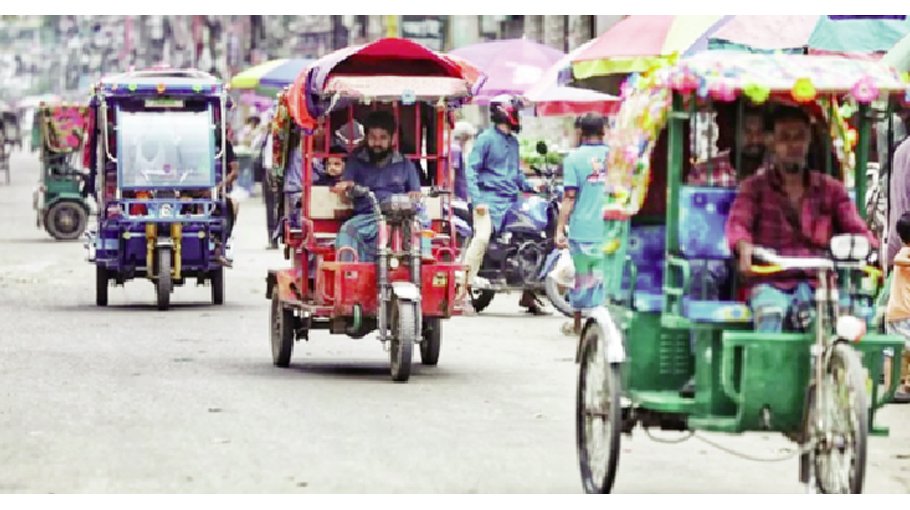Battery-rickshaws run unbridled

Despite several attempts to remove battery-powered rickshaws from Dhaka roads and streets the efforts on the part of the authorities concerned go into futility owing to a lack of greater coordination among relevant authorities.
Meanwhile, Dhaka’s traffic system hits hurdles because of the overwhelming presence of battery-run rickshaws on the roads.
Recently, DNCC (Dhaka North City Corporation) Administrator Mohammad Ejaz declared that no rickshaws would be allowed on the city’s main roads. He also said that charging stations and rickshaw production workshops would be shut down.
However, in reality, no such initiatives appear to be taking place. Charging stations and garages continue to operate as usual. Workshops producing battery rickshaws are also running in full swing.
Md Miraj, the owner of a battery rickshaw garage in Mirpur, said, “I have obtained an electricity connection for my garage through proper application, and I pay my electricity bills regularly.”
When asked if he received any notice from DESCO (Dhaka Electric Supply Company) to disconnect or shut off power to his garage, he replied, “No such directive has been issued. People say all sorts of things.”
Saiful Islam, owner of Al-Modina Battery House, added, “Our production and sale of auto-rickshaws are going on as usual just like before.”
When asked whether they received any official directive to stop manufacturing battery rickshaws, he replied, “No, we haven’t received anything like that.”
On the other hand, people involved in battery-rickshaw transportation argue that in this modern age, battery-powered rickshaws have replaced traditional pedal rickshaws. With no viable transport alternatives, these vehicles have become highly popular. Since there is high demand from passengers the government must consider alternatives before enforcing any ban.
Experts also say that a long-term plan is essential to control battery-powered rickshaws. However, the government needs a concrete and top-down strategy before removing these vehicles from roads.
Since August 5, the number of battery-powered rickshaws on Dhaka streets has risen sharply. Due to weakened enforcement, these rickshaws have spilled from narrow alleys onto highways and overpasses, according to rickshaw drivers and their association members.
Currently, these rickshaws operate recklessly across major roads in Dhaka and other cities, frequently causing accidents. Drivers ignore traffic rules and occupy roads at will, with little regard for lanes or regulations, taking over the streets while other vehicles halt for quite sometime.
The city corporations frequently conduct drives against unauthorised battery-powered rickshaws, but those prove abortive. On the other hand, the number of such rickshaws continues to grow in Dhaka.
Transport expert and BUET Prof Dr Md Hadiuzzaman said BRTA can’t shirk its responsibility to battery rickshaws regulate and control on the roads. Faulty three-wheelers pose safety risks; nevertheless an abrupt ban isn't practical due to their widespread use and dependence.
“It would have been better to control illegal three-wheelers from the beginning. Now, local politicians are allegedly involved in the production, regulation, and business of these vehicles. Therefore, a long-term plan is needed to address the issue,” he added.
He recommends bringing them under a policy framework and improving them technically. There should also be a detailed plan specifying which roads they can operate on and in what numbers.
On November 19 last year, the High Court ordered a halt to battery-powered rickshaw operations in Dhaka within three days. In response, rickshaw drivers staged massive protests, blocking roads and railway lines.
Amid the unrest, on November 25, the Chamber Court put a stay order on the High Court's directive following a government appeal.
The exact number of battery-powered rickshaws in Dhaka is not definite, though estimates suggest around 800,000 to 1 million.
According to private organizations, 4.8 to 5 million battery-powered rickshaws operate across the country.
Data from the Road Safety Foundation shows that from 2019 to October 2024, 6,422 people died in accidents involving these three-wheeled vehicles.
Last year alone, 870 accidents nationwide were attributed to auto-rickshaws, according to the Passenger Welfare Association. These accidents resulted in 875 deaths and 1,779 injuries.
Every day, reports pour in from different parts of the country highlighting casualties from such incidents.
Talebur Rahman, Deputy Commissioner (Media) of Dhaka Metropolitan Police (DMP), said, “Road management isn’t solely the responsibility of the police. Several other agencies are involved—like the city corporation, BRTA, and the Roads and Highways Department. We coordinate with them on all matters related to the roads.”



